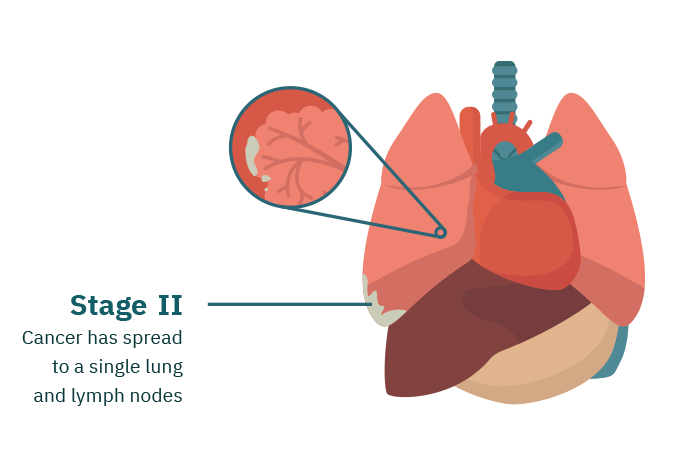Stage 2 mesothelioma is best characterized by limited spreading to nearby organs and tissues. Few cases of mesothelioma are caught at Stage 2 or earlier, and individuals typically live for only about 19 months or less.
A four-tiered staging system is utilized in categorizing the advancement and severity of cancer. For mesothelioma, Stage 2 is considered an early stage of the disease, typically distinguished by limited spreading of cancer cells to nearby organs and tissues.
Although with Stage 2 there has been some spreading, and possible lymph node involvement, the disease has typically not metastasized beyond the initial region in which it first developed. Symptoms usually start to become somewhat more noticeable in this stage.
The three mesothelioma staging systems provide a different descriptions of Stage 2 mesothelioma:
Stage 2 Mesothelioma Symptoms
Stage 2 mesothelioma symptoms are usually not as extreme as later stages, but they will start to increase in severity as the disease spreads further.
The most common symptoms of Stage 2 are:
- Shortness of breath (dyspnea)
- Chronic coughing
- Chest pains
- Unexplained weight loss
- Fever
Prognosis of Stage 2 Mesothelioma
The 5-year survival rate of mesothelioma patients diagnosed at Stage 2 is around 15 percent, which is somewhat better than the overall rate. However, in general, the prognosis for Stage 2 mesothelioma is still pretty poor, with a median life expectancy of 19 months.
When caught in earlier stages of the disease, mesothelioma patients generally have a better opportunity to extend their lives through curative treatments. However, the survival time of any particular patient depends on their individual circumstances, including the cancer location, histology (cell type), and other factors such as the patient’s overall health, age and gender.
Treatment Options for Stage 2 Mesothelioma
Stage 2 mesothelioma treatments typically include multimodal therapy – that is, a combination of surgery along with chemotherapy and/or radiation. In most cases, treatment is provided with the intent of putting the disease into remission.
Even in cases where a curative treatment is not possible, some therapies may provide palliative care, which can help relieve the pain and discomfort associated with the symptoms of the disease.
Experimental Treatments and Clinical Trials
Stage 2 mesothelioma patients candidates are great candidates for clinical trials. These trials offer patients a chance to try experimental treatments such as gene therapy, immunotherapy, gene therapy, and photodynamic therapy, which could offer better opportunities for long-term survival than conventional multimodal treatment.
Connecting with cancer centers is the first step to finding a clinical trial that could provide a life-saving emerging treatment. If you or a loved one has been diagnosed with mesothelioma, contact a cancer center to get more information about available trials.
Financial Assistance for Stage 2 Mesothelioma
Treating Stage 2 mesothelioma can be very costly, with expenses including diagnostic tests, hospital bills, and additional costs for things like traveling to and from clinics to visit doctors. Lost income from time out of work or disability due to illness can exacerbate the financial problems many mesothelioma patients experience.
Upon being diagnosed with Stage 2 mesothelioma, patients may want to look into how the many costs of treatment can be covered. If you or a loved one has been diagnosed, find out about the types of financial assistance that may be available to you.





